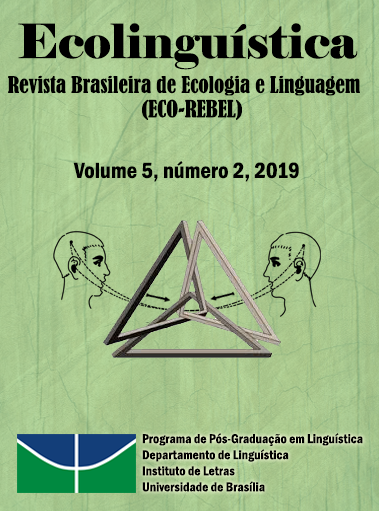A ecolinguística como ideia europeia
Keywords:
Ecologia da linguagem. Preservação de línguas. Crise ambiental; antropocentrismo. Crescimentismo.Abstract
"A ecologia da linguagem", paradigma criado pelo sociolinguista americano Einar Haugen, investiga a interação entre línguas na mente humana e em sociedades multilíngues. No caso, “ecologia” funciona como uma metáfora que é usada por alguns autores para falar da ideia de “conservação” de pequenas línguas e da preservação da diversidade linguística neste planeta. Por outro lado, a “ecolinguística” europeia toma o conceito de ecologia literalmente a fim de explorar o papel das línguas na crise ambiental atual. Mediante o paradigma ecolinguístico, a linguística assume uma nova tarefa: provocar uma consciência sobre os problemas ecológicos e, ao mesmo tempo, recuperar o sentimento de comunhão com todos os seres vivos. Em vez de olhar para a língua como “símbolo dos humanos como seres especiais” (usando-a nesse sentido), os ecolinguistas acentuam “nossa continuidade com o resto da criação” (HALLIDAY, 1992, p. 89), revelando o antropocentrismo e o crescimentismo imbutidos na língua e em seu uso. Com essa consciência, a linguagem humana se torna um recurso na empreitada de manter o princípio de “viver e deixar viver” contra o da sobrevivência do mais forte e mais apto.
Downloads
References
Beard, Henry and Christopher Cerf, The Official Politically Correct Dictionary and Handbook (New York: Villard, 1992).
Bolinger, Dwight, Language, the Loaded Weapon. The Use and Abuse of Language Today (London: Longman, 1980).
Denison, Norman, "A Linguistic Ecology for Europe?", Folia Linguistica 16/1-4 (1982): 5-16.
Denison, Norman and J. Tragut, "Language Death and Language Maintenance," Sociolinguistica 4 (Minderheiten und Sprachkontakt) (1990): 150-156.
Enninger, Werner and Lilith M. Haynes (eds.), Studies in Language Ecology (Wiesbaden: Steiner, 1984).
Fill, Alwin, Ökolinguistik. Eine Einführung (Tübingen: Narr, 1993).
Gründler, Hartmut, "Kernenergiewerbung. Die sprachliche Verpackung der Atomenergie," Holzfeuer im hölzernen Ofen. Aufsätze zur politischen Sprachkritik, ed. Hans Jürgen Heringer (Tübingen: Narr, 1977? 1982) 203-215.
Haarmann, Harald, Multilingualismus 2. Elemente einer Sprachökologie (Tübingen: Narr, 1980).
Halliday, Michael, "New ways of Meaning. The challenge to applied linguistics," Journal of Applied Linguistics 6 (1990): 7-36. Also in: Thirty years of linguistic evolution. Studies in honour of René Dirven, ed. Martin Pütz (Philadelphia, Amsterdam: John Benjamins, 1992): 59-95.
Haugen, Einar, The Ecology of Language, ed. Anwar S. Dil (Stanford: Stanford University Press, 1972).
Haugen, Einar, The Ecology of Language, ed. Anwar S. Dil (Stanford: Stanford University Press, 1972).
Jung, Matthias, "Der öffentliche Sprachgebrauch und die Umweltdebatte in der BRD. Versuch der Kommunikationsgeschichte eines Themas," Sprache und Literatur in Wissenschaft und Unterricht 63 (1989): 76-98.
Jung, Matthias, Gesellschaftliches Bewußtsein und sprachlicher Wandel. Eine Diskursgeschichte der Atomenergie (Opladen: Westdeutscher Verlag, 1994).
Leopold, Aldo, A Sand County Almanach, and Sketches Here and There (Oxford, New York: Oxford University Press, 1949).
Makkai, Adam, Ecolinguistics. Towards a New "Paradigm" for the Science of Language? (London, New York: Pinter, 1993).
Trampe, Wilhelm, Ökologische Linguistik. Grundlagen einer ökologischen Wissenschafts- und Sprachtheorie (Opladen: Westdeutscher Verlag, 1990).
Wandruszka, Mario, Die Mehrsprachigkeit des Menschen (München, Zürich: Piper, 1979).
[The European Legacy, vol. 2, 1997, 450-455.]
Downloads
Published
How to Cite
Issue
Section
License
Authors who publish in this journal agree to the following terms:
Authors retain copyright and grant the journal the right of first publication. The work is simultaneously licensed under the Creative Commons Attribution License allowing the sharing of the work with acknowledgment of the authorship of the work and initial publication in this journal.
Authors are authorized to enter into additional contracts separately for non-exclusive distribution of the version of the work published in this journal (e.g., publishing in institutional repositories or as book chapters), with acknowledgment of authorship and initial publication in this journal.
Authors are allowed and encouraged to post and distribute their work online (e.g., in institutional repositories or on their personal page) at any point before or during the editorial process, as this can bring about productive revisions as well as increase impact.
Citation of published works (See The Effect of Free Access).



3.png)



